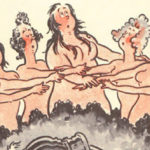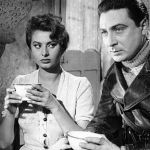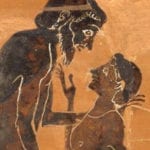 History
History  History
History  Movies and TV
Movies and TV 10 Movie Adaptations That Ruined Everything for Some Fans
 History
History 10 Dirty Government Secrets Revealed by Declassified Files
 Weird Stuff
Weird Stuff 10 Wacky Conspiracy Theories You Will Need to Sit Down For
 Movies and TV
Movies and TV 10 Weird Ways That TV Shows Were Censored
 Our World
Our World 10 Places with Geological Features That Shouldn’t Exist
 Crime
Crime 10 Dark Details of the “Bodies in the Barrels” Murders
 Animals
Animals The Animal Kingdom’s 10 Greatest Dance Moves
 Movies and TV
Movies and TV 10 Box Office Bombs That We Should Have Predicted in 2025
 History
History 10 Extreme Laws That Tried to Engineer Society
 History
History 10 Wars That Sound Made Up (but Absolutely Happened)
 Movies and TV
Movies and TV 10 Movie Adaptations That Ruined Everything for Some Fans
 History
History 10 Dirty Government Secrets Revealed by Declassified Files
Who's Behind Listverse?

Jamie Frater
Head Editor
Jamie founded Listverse due to an insatiable desire to share fascinating, obscure, and bizarre facts. He has been a guest speaker on numerous national radio and television stations and is a five time published author.
More About Us Weird Stuff
Weird Stuff 10 Wacky Conspiracy Theories You Will Need to Sit Down For
 Movies and TV
Movies and TV 10 Weird Ways That TV Shows Were Censored
 Our World
Our World 10 Places with Geological Features That Shouldn’t Exist
 Crime
Crime 10 Dark Details of the “Bodies in the Barrels” Murders
 Animals
Animals The Animal Kingdom’s 10 Greatest Dance Moves
 Movies and TV
Movies and TV 10 Box Office Bombs That We Should Have Predicted in 2025
 History
History 10 Extreme Laws That Tried to Engineer Society
10 Creators Who Hated What Others Did with Their Work
People have a great sense of attachment to what they have created. When a creator’s work gets into the hands of another person, sometimes it is hard to watch such a person make changes. Even the best-intentioned creator could become disillusioned by how another person uses his or her work. These are ten creators who hated what others did with their work:
Related: 10 Easter Eggs From Stephen King Adaptations
10 George Lucas Regretted Selling Lucasfilm to Disney
Star Wars is an American epic science fiction multimedia franchise created by George Lucas. It began as an eponymous film in 1977 and quickly became a worldwide pop culture phenomenon. The “Original Trilogy” was based on George Lucas’s ideas, and Lucas had planned a sequel trilogy but canceled it in 1981.
Then, the Walt Disney Company entered into negotiations to acquire Lucasfilm in 2011. The negotiations were eventually sealed in December 2012. During the negotiations, George Lucas submitted some stories for what the sequels should look like. They were largely discarded, and Walt Disney Studios went in another direction entirely. George Lucas felt betrayed, and his disappointment in seeing his vision for the Stars Wars franchise go down the drain is widely publicized.[1]
9 Roald Dahl Hated Willy Wonka and the Chocolate Factory
Many people consider Willy Wonka and the Chocolate Factory (1971) as a family classic, but Roald Dahl is not one of those people. Ironically, the movie was based on Dahl’s 1964 novel Charlie and the Chocolate Factory. One of the issues that Dahl had with the movie was the casting of Gene Wilder as “Willy Wonka.”
As Willy Wonka and the Chocolate Factory became a huge success, Dahl quickly emerged as the movie’s biggest critic, attacking several core elements of its filmmaking. Dahl also hated the title. He wanted the movie to be titled like his book—Charlie and the Chocolate Factory. When thinking about creators who hated what others did with their work, Dahl’s case is unique. He never loved any of the movie adaptations of his books.[2]
8 Alan Moore Hated Watchmen Movie Adaptation
Alan Moore is an English author known primarily for his work on comic books, especially Watchmen. He is widely recognized among his peers and critics as one of the best comic book writers in the English language. Expectedly, his work Watchmen was made into a movie, but it only created a monumental embarrassment for the producer. In an interview Moore granted, he referred to a letter written to him by Damon Lindelof, who was the executive producer of Watchmen movie as full of “neurotic rambling.”
Moore denounced and disassociated himself from the Watchmen movie at every given opportunity. He also told Damon Lindelof not to contact him again ever. Ironically, the movie series was a smash hit, earning several Primetime Emmy Awards nominations and winning several prizes. While the audience seems to be in love with Moore’s work, he himself has not watched the movie or any other movie adaptation based on any of his works.[3]
7 Charles Schulz Hated That His Work Was Titled Peanuts
Peanuts is a syndicated daily and Sunday American comic strip written and illustrated by Charles M Schulz. The comic strip’s original run extended from 1950 to 2000, continuing in reruns afterward. At the time of the death of Charles Schulz in 2000, Peanuts ran in over 2,600 newspapers with a readership of around 355 million in 75 countries and was translated into 21 languages.
When the first daily Peanuts strip ran on October 2, 1950, all didn’t go down well with the creator, who did not like the name given to his creation. The name was chosen at random by a newspaper editor. Schulz had previously published a cartoon called “Li’L Folks,” which included forerunners of the Peanuts characters and wanted to keep it that way. He wanted a strip with dignity and significance, but the name he wound up with sounded too insignificant, and he couldn’t do anything about it.
Several years after the comic strip stuck with the name Peanuts, Schulz remained displeased with the name, but he didn’t let the problem with the name get in the way of his art. He continued to work on the comic strip throughout his lifetime. And from the pages of these newspapers, the cast of Peanuts characters appeared in numerous TV specials, a Broadway production, and a 2015 movie.[4]
6 Don Henley Refused to Licence Frank Ocean’s Use of “Hotel California”
Don Henley is an American musician and founding member of the rock band the Eagles. He was the drummer and one of the lead vocalists. When the Eagles disbanded in 1980, Henley pursued a solo career.
It happened that an alternate hip-pop legend decided to write new lyrics to the Eagles hit song, “Hotel California.” Frank Ocean made the remix song available on the internet for free and also performed it live. Don Henley was not having it at all and refused to grant a license to the song for commercial release.[5]
5 Michael Ende Hated the Movie Adaptation of The Neverending Story
The movie The Neverending Story is a 1984 fantasy film co-written and directed by Wolfgang Peterson and based on the 1979 novel of the same name by Michael Ende. At the time of its release, it was the most expensive film produced outside the United States or the Soviet Union. When Ende was informed that the story would be brought to the screen, he was initially apprehensive because he could not figure out how the producers would manage to transform his complex book into a movie.
However, the producers managed to allay his fears, and he gave the go ahead for the movie to hit the screens. As a precaution, he stipulated that the choice of director, lead actor, and set designer would be dependent on his approval. He also agreed to act as a consultant to the production company so that the film would conform to his vision of the book.
One way or the other, the producers and director managed to screw things up, and the movie did not conform to the story in the book in totality. Ende was so disgusted with the outcome that he requested that his name be removed from the movie credits.[6]
4 Stephen King Hated Kubrik’s Adaptation of The Shining
The movie The Shining is a 1980 horror film produced and directed by Stanley Kubrick. It is based on Stephen King’s 1977 novel of the same name. While the public regarded the movie as one of the defining works of the horror genre, King disliked the end result and criticized it for years.
The underlying reason behind Stephen King’s criticism of the movie adaptation is that Kubrick deviated from the book and built his own vision while using King’s novel as a starting point. While King went as far as providing a screenplay for the movie, Kubrick did not bother to read it and did not make any attempt to collaborate with him on a new one.[7]
3 Bret Easton Ellis Doesn’t Believe American Psycho Can Work as a Movie
American Psycho is a 2000 satirical psychological horror film directed by Mary Harron and based on the 1991 novel by Bret Easton Ellis. Ellis considered his controversial book “unfilmable” due to its graphic nature, but producer Edward R. Pressman was determined to adapt it and bought the film rights in 1992.
Although the movie became an instant hit, Ellis did not like the outcome. Not only did Ellis openly criticize the movie, he went as far as looking for an excuse to trivialize the commercial success of the movie. In Ellis’s view, the producers of the movie did not do anything remarkable, and the success of the movie was largely due to the “sense of culture wokeness” portrayed in the film.[8]
2 Winston Groom Hated Forrest Gump Movie and the Chocolate Gifts
Forrest Gump is a 1994 American epic comedy-drama film directed by Robert Zemeckis. It is based on the 1986 novel of the same name written by Winston Groom. Forrest Gump was released in the United States on July 6, 1994, and received mostly positive reviews. Surprisingly, Groom hated the movie.
One of the reasons behind is hatred is that the movie’s famous line is “Life is like a box of chocolates,” whereas the actual line from the book is “Being an idiot is no box of chocolates.” This ended up having unintended consequences because Groom got sent boxes of chocolates wherever he went. He actually hated chocolate.[9]
1 J.D. Salinger Banned Hollywood from Ever Going near His Works
Jerome David Salinger was an American author best known for his 1951 novel The Catcher in the Rye. The novel was an instant success, and it still remains relevant in American literature to this day. Despite the fact that the book was published several decades ago, there is no Hollywood adaptation of the movie.
Throughout decades, every piece of literature that is considered a classic has managed to become adapted multiple times and through multiple mediums, most especially movies. However, The Catcher in the Rye is a notable exception. The reason is easy to understand as J.D. Salinger, in his lifetime, did not grant permission for the book to be adapted into a movie, and his estate remained faithful to his legacy.
There was a time when the author was enthusiastic about his books being adapted into movies. In 1949, he allowed his short story “Uncle Wiggily in Connecticut” to be adapted into a film titled My Foolish Heart. The end product was a huge flop that substantially deviated from the plot of the novel. Salinger was tremendously disappointed in the outcome. He then banned Hollywood from coming close to any of his works.[10]








